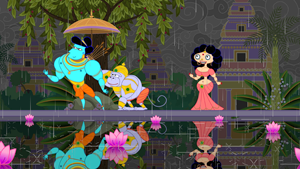Sita Sings the Blues

As an independent woman struggling to experience life for myself instead of through a man, I’m always looking for inspiration from other women who develop identities beyond being appendages or servants to men. As I was already familiar with the story of Sita, a Hindu goddess, I was curious to see how Nina Paley would present the story in her animated film. Simply going by the graphics, the movie is a fantastic exploration of the parallels between the ancient mythological world and modern day. The animation is split into three distinct segments which alternate: Sita’s journey, the three shadow puppet narrators, and Nina’s marriage, which spans America and India.
A polished and highly stylized production, Sita Sings the Blues is, surprisingly, Paley’s first full length film. Music, dance, and comedy fill the screen with bright colors and sounds and there is a mix of Indian flavor and 1920s jazz. The only visual that bothered me was Sita’s tiny waist line, giant boobs and matching swivel hips—then again, that image might be a deliberate mockery of feminist ideals on Paley’s part.
Sita and her modern sister, Paley, follow and devote themselves to their respectful husbands. Sadly, their loyalty isn’t enough to win reciprocal devotion from the men. Sita goes through trial after trial in her displays of devotion; she’s kidnapped by an evil king and her husband Rama accuses her of being unfaithful; she has his babies and he takes his sons back (but not her) and so on. Paley follows her husband across the globe to India where he shows absolutely no interest in her and, in fact, leaves her not only sexually frustrated, but alone.
As the two women continue to make sacrifices for their unresponsive men, the clever puppet narrators debate the difference between unconditional love and martyrdom. In the process, they help to explain the history behind the Sita myth. A fantastic film, it is free to all audiences under a Creative Commons License, so give it a view!
I've read The Ramayana and found the ending and how Rama left Sita extremely depressing. Thanks for reviewing this, I'm definitely checking this out!